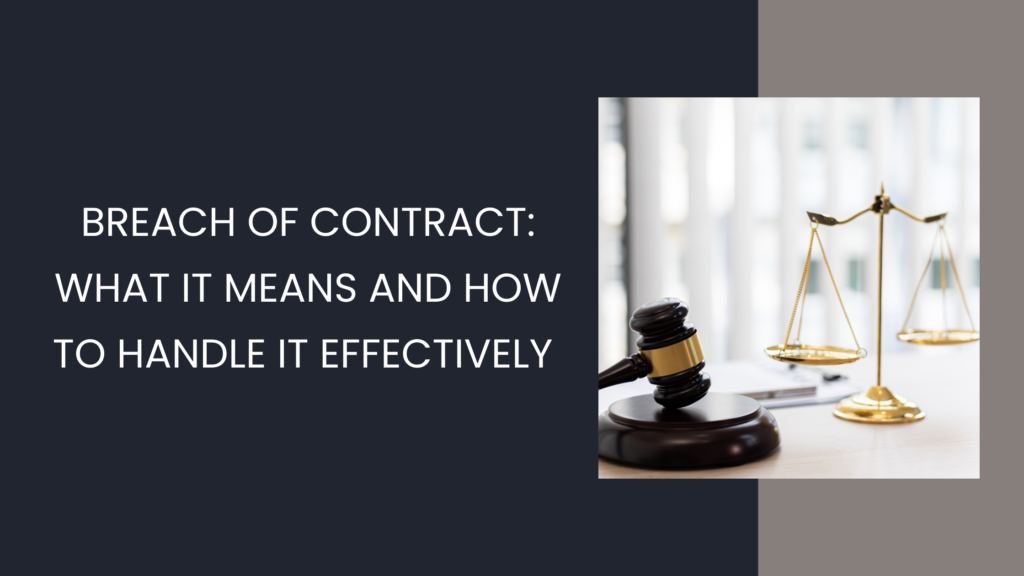Contracts are the cornerstone of most business transactions and personal agreements. They set the expectations and obligations of the parties involved. However, despite best efforts, breaches of contract can and do occur. Understanding what constitutes a breach of contract and knowing how to handle it effectively can help mitigate potential damages and resolve disputes efficiently. This blog will explore the concept of a breach of contract and offer practical guidance on managing and addressing such situations.
What Is a Breach of Contract?
A breach of contract occurs when one party fails to fulfill their obligations under a contract. This failure can be total or partial, and it can result from various issues such as non-performance, delayed performance, or performance that does not meet the agreed-upon terms. Under Indian law, breaches are classified into different types, including:
Material Breach: A significant failure that goes to the heart of the contract, allowing the non-breaching party to terminate the contract and seek damages.
Minor Breach: A less severe failure that does not fundamentally undermine the contract, usually allowing for the continuation of the contract with a claim for damages.
Anticipatory Breach: When one party indicates in advance that they will not perform their contractual obligations, giving the other party grounds to act before the actual breach occurs.
Common Causes of Breach of Contract
Understanding the common causes of breaches can help in both prevention and resolution:
Non-Performance: Failure to perform the contractual obligations as agreed.
Delayed Performance: Failure to complete obligations within the stipulated time frame.
Defective Performance: Performance that does not meet the quality or standards specified in the contract.
Misrepresentation: Providing false information or misleading statements that affect the contract’s validity.
Steps to Handle a Breach of Contract Effectively
Review the Contract
Why It Matters: The first step in addressing a breach is to review the contract thoroughly. Understanding the terms and conditions, as well as any clauses related to breach and dispute resolution, is essential.
Action: Examine the specific obligations of the breaching party and the remedies available under the contract. Pay attention to any clauses that outline the process for addressing breaches and any stipulated notice periods.
Document the Breach
Why It Matters: Proper documentation provides evidence of the breach and supports your claims if legal action becomes necessary.
Action: Collect and organize all relevant documents, communications, and records related to the breach. This may include correspondence, performance reports, and any evidence of non-compliance.
Notify the Breaching Party
Why It Matters: Informing the breaching party of their failure gives them an opportunity to address the issue and may lead to a resolution without resorting to legal action.
Action: Send a formal notice of breach to the breaching party, detailing the nature of the breach and requesting corrective action or performance. This notice should be in writing and may need to follow specific procedures outlined in the contract.
Consider Mediation or Negotiation
Why It Matters: Mediation or negotiation can be a less adversarial and more cost-effective way to resolve disputes.
Action: Propose mediation or negotiation to resolve the breach amicably. This approach can help maintain business relationships and avoid lengthy litigation. Ensure that any agreement reached is documented and formalized.
Assess Legal Remedies
Why It Matters: If the breach cannot be resolved through informal means, legal remedies may be necessary to recover damages or enforce performance.
Action: Evaluate the legal remedies available, such as:
Compensatory Damages: Financial compensation for losses incurred due to the breach.
Consequential Damages: Compensation for indirect losses caused by the breach.
Specific Performance: A court order requiring the breaching party to fulfill their contractual obligations.
Rescission: Termination of the contract and restitution of any benefits conferred.
File a Lawsuit if Necessary
Why It Matters: If other methods fail, legal action may be required to enforce your rights under the contract.
Action: Consult with a legal expert to determine the appropriate course of action. Filing a lawsuit should be considered a last resort after exploring all other avenues for resolution.
Preventing Breaches of Contract
While it’s crucial to know how to handle breaches, prevention is equally important:
Clear Drafting: Ensure that contracts are drafted clearly and comprehensively to avoid ambiguities and misunderstandings.
Regular Monitoring: Monitor performance and compliance regularly to detect and address issues early.
Risk Management: Implement risk management practices to identify and mitigate potential risks that could lead to breaches.
Conclusion
A breach of contract can have significant implications for businesses and individuals alike. By understanding what constitutes a breach and taking proactive steps to address and resolve it effectively, parties can protect their interests and maintain healthy contractual relationships.


